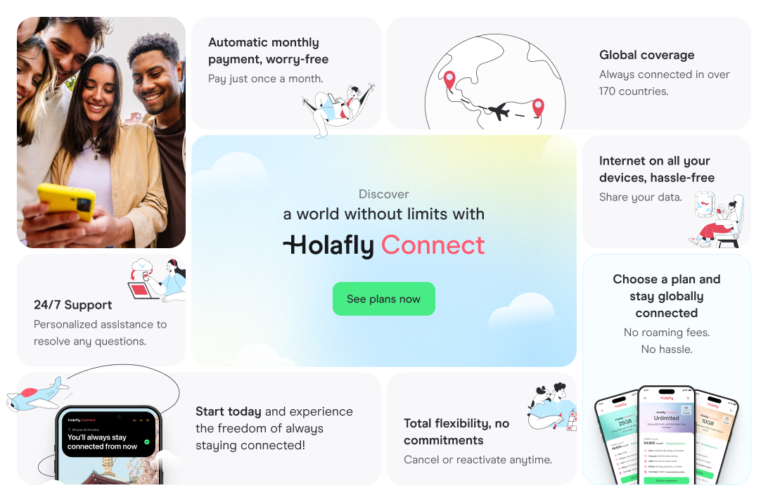South Africa Digital Nomad Visa: How to Apply and Key Steps for 2025
Did you know that there is a digital nomad visa in South Africa? Check out more in this article to work remotely in this country.
Can you imagine working remotely in Cape Town or Johannesburg? South Africa has developed a digital nomad visa called the Remote Work Visa so that workers who only need their laptop to work online can do so legally in the country. South Africa’s major cities have good telecommunications infrastructure and a stable internet network, especially in urban areas. This allows digital nomads to work effectively and connect with the rest of the world.
South Africa has modern coworking spaces and large and growing communities of digital nomads. Furthermore, compared to Europe or North America, South Africa offers a more affordable cost of living, especially when it comes to accommodation and food. Pack your bags and be sure not to miss a single detail we tell you in this blog so you can get your digital nomad visa for South Africa!
What is the Remote Work Visa and how does it work?
The Remote Worker Visa allows remote workers to reside temporarily in South Africa without the need to obtain a conventional work visa. This initiative seeks to attract freelancers and remote workers from various industries, giving them the opportunity to combine their digital lifestyle with the attractive environment of South Africa. The visa was created in response to the growing demand from people who, in the aftermath of the pandemic, chose to work from anywhere in the world without the need to commute to an office.
South Africa offers digital nomads ample technology infrastructure, a competitive cost of living and a variety of natural and urban environments. If you sign up for the Holafly eSIM you will have unlimited data, allowing you to stay connected nationwide. Attractive cities such as Cape Town and Johannesburg, places like the Kruger National Park, Table Mountain and the Cape Coast are among the most visited and offer unique experiences for those who love nature and a dose of adventure. Being able to work remotely in such an environment has become an incentive for more and more workers to apply for the digital nomad visa for South Africa.
Characteristics of the Remote Work Visa
The South African Remote Worker Visa is an opportunity designed for freelancers, remote workers and digital nomads who wish to establish a temporary base in the country while maintaining their jobs abroad. Here are the main features and benefits of this visa:
- Duration of stay: the visa allows a stay of up to one year, with the possibility of renewal. The renewal would be for an additional period if the applicant continues to meet the requirements and purpose of the visa. This makes it an ideal option for an extended stay without repeatedly applying for a tourist visa.
- Permitted activities: the holder may carry out remote work for foreign companies or their own businesses outside South Africa. The visa does not allow you to work for local South African employers, which is to ensure that jobs intended for the local population are not taken.
- Income requirements: to be eligible, applicants must demonstrate a minimum monthly income level that varies according to South African government updates. This guarantees their economic self-sufficiency during their stay in the country. This is to ensure that remote workers have the means to cover their living expenses without relying on local resources.
- Access to local services: as the Remote Worker Visa does not grant direct access to South Africa’s public health system, many travellers choose to take out private health insurance. South Africa has an extensive network of private health insurance companies offering quality coverage. Having an adequate policy that covers medical care and emergencies is recommended.
- Travel connections: with the South African Digital Nomad Visa, holders can enter and leave the country freely during its validity period, allowing the flexibility to travel and explore other African or international destinations without affecting their permit to stay.
- Costs and fees: the visa has a specific application fee and additional processing fees, although these are usually more affordable than traditional work visas. Details of the exact cost vary and are updated regularly, so it is advisable to check the official information before proceeding.
- Simple application process: unlike other types of visas, the Remote Worker Visa is designed to facilitate the temporary stay of remote professionals. This makes the application process less complex, with clear requirements and faster response times.

General application requirements
If you want to apply for a digital nomad visa for South Africa, you need to meet specific requirements to ensure that you can reside in the country while working remotely for a foreign company. Here are some of the most important conditions:
- Proof of employment or employment contract: a letter from the foreign employer or, if self-employed, an employment contract with international clients must be submitted. This demonstrates that the applicant has a source of income outside South Africa and will not seek employment in the local labour market.
- Minimum income level: South Africa requires a minimum income level to ensure that the applicant is able to support himself/herself financially while residing in the country. This amount usually varies, but it is important to present bank or income documents that meet this requirement.
- Valid health insurance: applicants must have valid international or local medical insurance or local health insurance that is valid for the duration of the stay in South Africa. This ensures that any medical expenses will be covered without having to rely on the public health system.
- Personal documentation and background: a copy of a valid passport and, in some cases, a criminal record certificate from the country of origin or previous residence is required, especially for long stays. This requirement is part of the country’s security policies.
- Proof of residence: you will usually be asked for a provisional address of residence in South Africa, either an accommodation reservation or a rental contract.
Important: If you are a frequent traveler and want to stay connected without worrying about expensive roaming or looking for a new SIM at every destination, Holafly’s subscription plans are for you. With a single eSIM, enjoy internet in more than 170 countries for a fixed price and no surprises on your bill. travel without limits and connect easily and securely! 🚀🌍

Documentation to be submitted
To apply for a Remote Worker Visa inSouth Africa, you must submit a number of documents that prove your employment, financial and health status. Each of these documents ensures that the applicant meets the legal and financial requirements to reside in the country. This means that you can work remotely, but only for a foreign entity. The most important documents that are usually required are listed below:
- Valid passport: the passport must be valid for at least six months from the date of entry into the country and have several blank pages for immigration stamps.
- Letter of employment or contract: this document should confirm the applicant’s employment with a foreign company or contractual relationship with international clients, indicating that the income is from outside South Africa.
- Proof of income: evidence that the applicant has sufficient funds to support himself/herself in the country is required. This may include recent bank statements or proof of monthly income that meets the minimum income threshold.
- Medical insurance: health insurance to cover medical expenses in South Africa during your stay is compulsory. This can be international insurance or insurance purchased in South Africa.
- Criminal record certificate: in many cases, a criminal record certificate issued in the country of origin or in the country where the applicant has previously resided for more than one year is requested.
- Proof of South African residency: some applicants are required to provide proof of South African residency. Either an accommodation reservation or a rental contract is valid. This is to prove that they have a place to live when they arrive.
- Completed application form: finally, it is necessary to complete and submit the specific application form for the Remote Worker Visa. It is usually available on the website of the South African Department of Home Affairs.

Where can I apply for a digital nomad visa for South Africa?
The process for applying for a digital nomad visa in South Africa can be initiated through various official platforms, both online and at physical locations. Applicants can use the website of the South African Department of Home Affairs. Here you can get up-to-date information on the requirements, necessary documents and application details.
You can also visit the South African embassy or consulate in your home country. They offer assistance and allow you to process certain visa requirements. Embassies facilitate the process through multilingual resources and often offer additional advice on meeting the requirements for entry into South Africa. In addition, there are visa application centres that handle visa applications in various cities around the world, such as the Visa Application Centres (VACs) that work with the South African government.
Where can I get tailored advice?
Applying for the Remote Worker Visa may present some challenges, especially if you have to manage the whole process from abroad or are not fluent in English. For this reason, several companies specialising in migration and employment consultancy offer assistance with visa procedures for digital nomads in South Africa.
These companies have extensive experience in processing residence and work visas in South Africa. Therefore, they are very helpful in managing every step of the process, including the review of documents and compliance with local immigration requirements. Some of the most recommended options are:
| Company | Available languages | Opening hours | Channels of communication |
|---|---|---|---|
| Move Up SA | English and Afrikaans | Monday to Friday, 9:00 – 17:00 | E-mail and telephone |
| New World Immigration | English and Spanish | Monday to Friday, 8:30 – 18:00 | Telephone, online chat and email |
| VisaBox | English | Monday to Friday, 9:00 – 17:30 | Email and online chat |
| Global Migration SA | English and Portuguese | Monday to Friday, 8:00 – 16:30 | Telephone, WhatsApp and email |
Frequently asked questions when applying for a digital nomad visa for South Africa
The South African digital nomad visa usually has an initial duration of between six and twelve months, depending on current regulations. Some applicants may be able to renew it for an additional period if they meet the long-stay requirements.
Yes, some Remote Worker Visa holders may choose to change their immigration status to permanent residence. However, in order to do so they must meet certain specific additional criteria.
Yes, in most cases, this visa allows for multiple entries and exits from the country. Even so, we recommend that you check visa validity and entry policies to avoid immigration problems.
This will depend on your length of stay and income. Generally, if you reside in South Africa for more than 183 days in a year, you may be considered a tax resident and may be subject to local taxation.
The Remote Worker Visa allows applicants to bring family members to South Africa, but this requires additional documentation for each accompanying person and, in some cases, additional fees. Please note that the deadlines may be slightly longer.
South Africa offers many safe and attractive areas to live in, such as Cape Town and Johannesburg. However, it is advisable to research the areas and follow safety recommendations to avoid any mishaps.
Costs can vary depending on the city. Some of the cheapest cities to live in are George and Jeffreys Bay. These cities offer a lower cost of living compared to larger cities such as Cape Town or Johannesburg. On average, monthly expenses, including accommodation, transport and food, range between $1,000 and $2,000.





 Language
Language 


















 No results found
No results found







